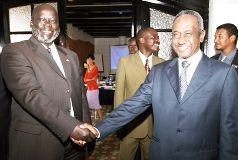Sudan prepares to draft interim constitution amid opposition boycott
KHARTOUM, April 30 (AFP) — Sudanese leaders are to begin Saturday drafting an interim constitution expected to seal a peace deal with the south, but with major opposition groups boycotting the meeting.

|
|
John Garang, and Ali Osman Taha shake hands, Thursday, Oct.7, 04, during the opening of the fifth session of the high level consultative meeting on the Peace Talks in Nairobi (AP). |
Inauguration of the process coincides with the deployment of international forces to support the January 9 peace accord the government signed with the Sudan Peoples’ Liberation Movement (SPLM) in Kenya.
The first 12 United Nations troops, all from Nepal, arrived early this week and more will follow over the coming days, according to the UN Mission in Sudan.
The UN Security Council in March approved the deployment of 10,000 UN troops to shore up the north-south peace agreement that ended 21 years of fighting, which left some 1.5 million people dead.
Sudanese President Omar al-Beshir and SPLM leader John Garang will address the 60-strong National Constitutional Review Commission’s (NCRC) inaugural session Saturday during a ceremony in the capital Khartoum, officials said.
Garang will not be physically present in Khartoum, which he has not visited since 1983 when his movement declared war against Khartoum, demanding greater autonomy for the animist and Christian south from Arabised Muslim north.
He will address the gathering by telephone, officials said.
Sudan’s ruling National Congress (NC) party and its peace partner, the SPLM, decided to proceed with preparations to inaurgurate the NCRC after they failed to persuade the country’s main opposition groups to sign up.
Sudanese Foreign Minister Mustafa Osman Ismail said on Wednesday that the meetings would begin “in spite of the absence of some political parties”.
A new constitution is crucial as it would clear the way for the formation of a national unity government and usher in a six-year interim period called for in the January peace accord.
Ismail’s comments came as a six-man team of NC and SPLM officials arrived in Khartoum from Cairo after fruitless meetings with the National Democratic Alliance, a grouping of mostly northern opposition forces.
The NDA, Sudan’s principle opposition bloc, represents the most formidable political challenge to the NC and includes the Democratic Unionist Party (DUP), the country’s second-largest political movement.
It signed an initial agreement with the government earlier this year, but refused to join the process until the signing of a comprehensive agreement.
NDA officials said some issues remain to be resolved such as the status of their forces and further discussions on a permanent constitution.
“We cannot participate in this process because the issue of a constitution is an item on the agenda of our dialogue with the government,” said El-Tom Hago, the DUP’s representative in the NDA.
Hago also held Khartoum responsible for the deadlock in the process.
“The government said it would return to the negotiations only after we set a date for the signing of a final agreement. We believe a date should be set after the conclusion of discussions on all issues,” said Hago.
A last-ditch effort by Garang to bring the NDA on board during a meeting with DUP chairman and NDA leader Mohammed Osman al-Mirghani in the Eritrean capital Asmara on Wednesday also died on the vine.
In Khartoum, the Umma party of former prime minister Sadiq al-Mahdi and 10 other opposition groups issued a joint statement charging that the makeup of the NCRC was not representative of the country’s political landscape.
“The constitution is a document that expresses the consensus of the nation and all ingredients of the Sudanese people and should guarantee the rights of all parties, not only those of specific parties,” said the statement.
The Umma and others object to the insistance of the NC and SPLM on applying general power-sharing quotas agreed upon in the peace agreement, which give them 52 percent and 28 percent of the seats respectively.
The arrangement leaves other northern and southern parties a paltry 20 percent and no power to block decisions.
The Islamist opposition Popular Congress party of jailed leader Hassan al-Turabi has expressed reservations but accepted to take part in the constitution-drafting process.
Only a handful of groups, mostly breakaway factions of the major political parties and the Muslim Brotherhood, widely considered an extension of the ruling NC party, have agreed to join the NCRC without conditions.
